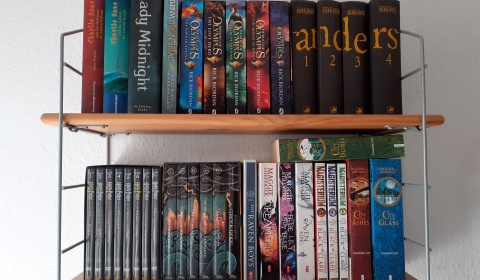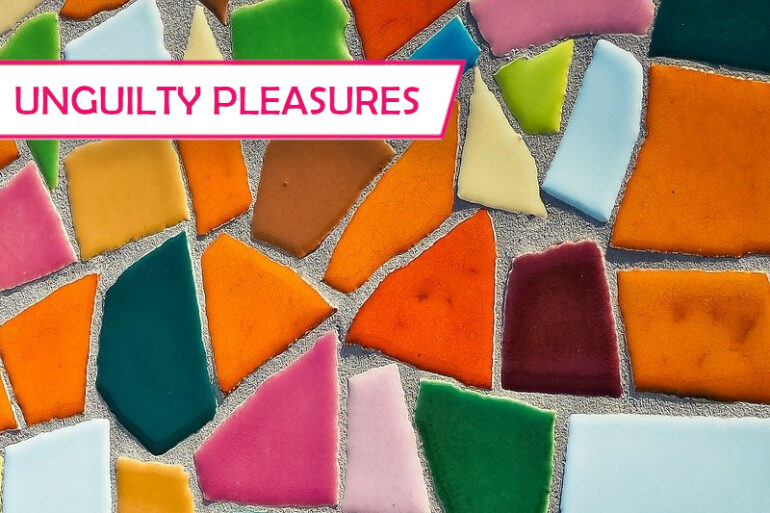Can something be ignored and ridiculed at the same time? Many people probably wouldn‘t know what Urban or Contemporary Fantasy means, yet they almost certainly have encountered it before. But what exactly is it? And why do (some) readers think they need to feel guilty for enjoying it?
By Tom Rösner
Picture: Via Pixabay, CC0, editing: Hanna Sellheim
Fantasy. The word alone evokes images of elves and trolls, medieval castles and epic battles, and fans dressed up in elaborate costumes. When people hear »fantasy«, they think of the Tolkien-ish High Fantasy, or, lately, HBO’s Game of Thrones. The fantasy genre has long been looked down upon as something weird or nerdy, and is often disregarded by academia or literary circles. Fantasy has since seeped into the mainstream, and through its popularity, the public’s opinion has somewhat shifted. Still, people tend to mostly equate Fantasy with High Fantasy, not knowing how diverse the genre can be.
Series
Be it food or pop culture – the term »Guilty Pleasure« means everything that we’re ashamed of liking. But why do we even think that some pleasures are guilty? In our series »Unguilty Pleasures« we want to unpack and question the term. For that, Litlog authors write about which entertainment genres and trash programs they utterly enjoy – and demand: pleasure without guilt! You can find more articles here.
So what is the difference between High Fantasy and Contemporary Fantasy? The Lord of the Rings, written by the aforementioned J. R. R. Tolkien, can be seen as a perfect example: High Fantasy is set in a different, fictional world, usually with supernatural elements (magic, fictional creatures, etc.) which are deeply ingrained in the story’s framework. Often, High Fantasy stories involve an epic tale, traditionally a fight between good and evil – a dark lord, like Sauron in Lord of the Rings, and a hero, who is struggling to oppose them. Contemporary Fantasy, on the other hand, has stories set in modern times (or, times that were contemporary to the author’s time) and the real world. Fantastical elements, such as magic and creatures, exist but usually are hidden or need some sort of portal to access, thus explaining why they aren’t known in “our” world. Urban Fantasy, with which it is often equated, is actually a sub-genre of Contemporary Fantasy. It is used to describe a story specifically set in a city.
Many people may not know the different terms, but they do know examples of Contemporary Fantasy. Some of the best-selling books of all times qualify as such: Harry Potter and the Twilight series Now, certainly nobody would argue that Harry Potter is underrated and few would name it as their »guilty pleasure« – except for the fact that sometimes, adult readers are ridiculed for reading children’s or young adult fiction in general. Similarly, academia has taken quite a bit of interest in these books, but still sometimes frowns upon taking it seriously due to its supposed lack of literary quality.
A lot of Contemporary Fantasy, on the other hand, definitely qualifies as »guilty pleasure« and many fans of Twilight, for example, say they are ashamed now or have been shamed by others for liking it. But why is that? Well, one can speculate!
Why some people put the guilt in guilty pleasure
Fantasy as a whole and Contemporary Fantasy in particular are often deemed to be a waste of time, or simply not »worth it«. The arguments that (Contemporary) Fantasy opponents use for this are numerous. Some argue that due to its setting in a different world or fantastical elements, the genre has no or little relevance to the real world. Others argue that it is not »challenging« enough, both on an intellectual and a linguistic level, and thus does not serve a purpose – and entertainment or joy, for many people, is not a good enough reason to read. But there might also be more at play here, since not just the »literary elite« tends to judge readers of Contemporary Fantasy.
Adult Contemporary Fantasy exists plenty. There are some written by notable Fantasy authors such as Neil Gailman or Tanya Huff and some that have received critical acclaim (The Magicians by Lev Grossman, for example), while many are more niche and venture into romance/sex territory. But some of the most commercially successful books in the Contemporary Fantasy genre are »Young Adult« (Twilight, The Mortal Instruments) or »Middle Grade« (Harry Potter, Percy Jackson).

Whereas criticism for the MG fantasy is more about the »literary value«, the criticism of a series like Twilight often seems to be more about shaming its fans. A lot of YA Contemporary Fantasy is aimed at a young female audience. In part, this may be due to the fact that female authors dominate the genre with their female protagonists, even in Adult Contemporary Fantasy. People – not always, of course, but often – tend to enjoy literature they feel represented by and can relate to. As such, the female narration, written by female authors, may provide a safe space to engage with the topics discussed in Contemporary Fantasy, which, fantastical plot aside, also often include romance, identity and (self-)empowerment.
The invalidation of teenage girls’ interests is a well-documented phenomenon that is not limited to literature, but can also be seen in music (just think of the dismissive attitude towards boybands) or video games (just think of the gate-keeping that female gamers experience). This not only makes teenage girls feel guilty about enjoying what they enjoy, but also adult female readers – and male readers of all ages. In my school days, I would have never admitted that I read all of the Twilight books and actually enjoyed them, out of fear that this would lead to ridicule for liking »girly« things.
Why readers shouldn’t feel the guilt in guilty pleasure
This is not meant to say that all criticism of certain books or even certain trends within the genre is invalid. Especially given its younger target audience, it cannot be denied that Young Adult Contemporary Fantasy has a responsibility to its readership. And many people have rightfully called out problematic themes, whether it be some female protagonists’ internalized misogyny (»I’m not like other girls«) or the romanticizing of toxic relationships (no, obsessive jealousy is not cute). But Contemporary Fantasy also has a lot of possibilities.
While High Fantasy often, not always, seems somewhat rigid in its rules, Contemporary Fantasy does not have that same problem. The stories can be anything, as long as they are set in the authors’ time period. There’s no need for racism, sexism or homophobia just for the sake of some »medievalist realism«. Instead, Contemporary Fantasy is a genre of self-discovery and a search for identity that embraces those who are different, which many readers, young or adult, can relate to and feel represented by. Whereas many genres tend to discuss certain real-life issues either metaphorically (Fantasy) or by reflecting them literally in their work (Contemporary fiction), Contemporary Fantasy has the flexibility to do both due to its combination of fantastical elements and »real world« setting. Even the argument of the genre not having »educational value« is not true. Contemporary Fantasy also often explores or is inspired by mythology, history and folklore, teaching the readers in a way that is more engaging than studying it might be.
The Future of Contemporary Fantasy?
For many, Middle Grade Fantasy is the gateway into the world of reading. It certainly was for me, and I will be eternally grateful for it. Rather than shame readers – particularly young readers – for what they read, they should be encouraged. Reading books, even (Contemporary) Fantasy, as much as some people want to deny it, helps us learn and improve, for instance, our language skills. And I strongly believe that a book’s genre does not say anything about its literary value, nor its linguistic style. I would even argue that some of the most beautifully-written books language-wise that I have ever read are Contemporary Fantasy for young adults. The Raven Cycle by Maggie Stiefvater, for example, has captivated me not only with its characters and plot, but also with its language, metaphors and literary imagery in a way that few books before or after ever have.
Television has already begun to embrace Contemporary Fantasy, often adapting its books to the small screen. The Magicians, The Vampire Diaries or Shadowhunters have all amassed a loyal following, and the new adaptation of Rick Riordan’s Percy Jackson series is highly anticipated. It is high time for the literary elite to accept that reading for entertainment, for »pleasure«, does not mean you should feel guilty… especially when it comes to a genre that is clearly here to stay.






